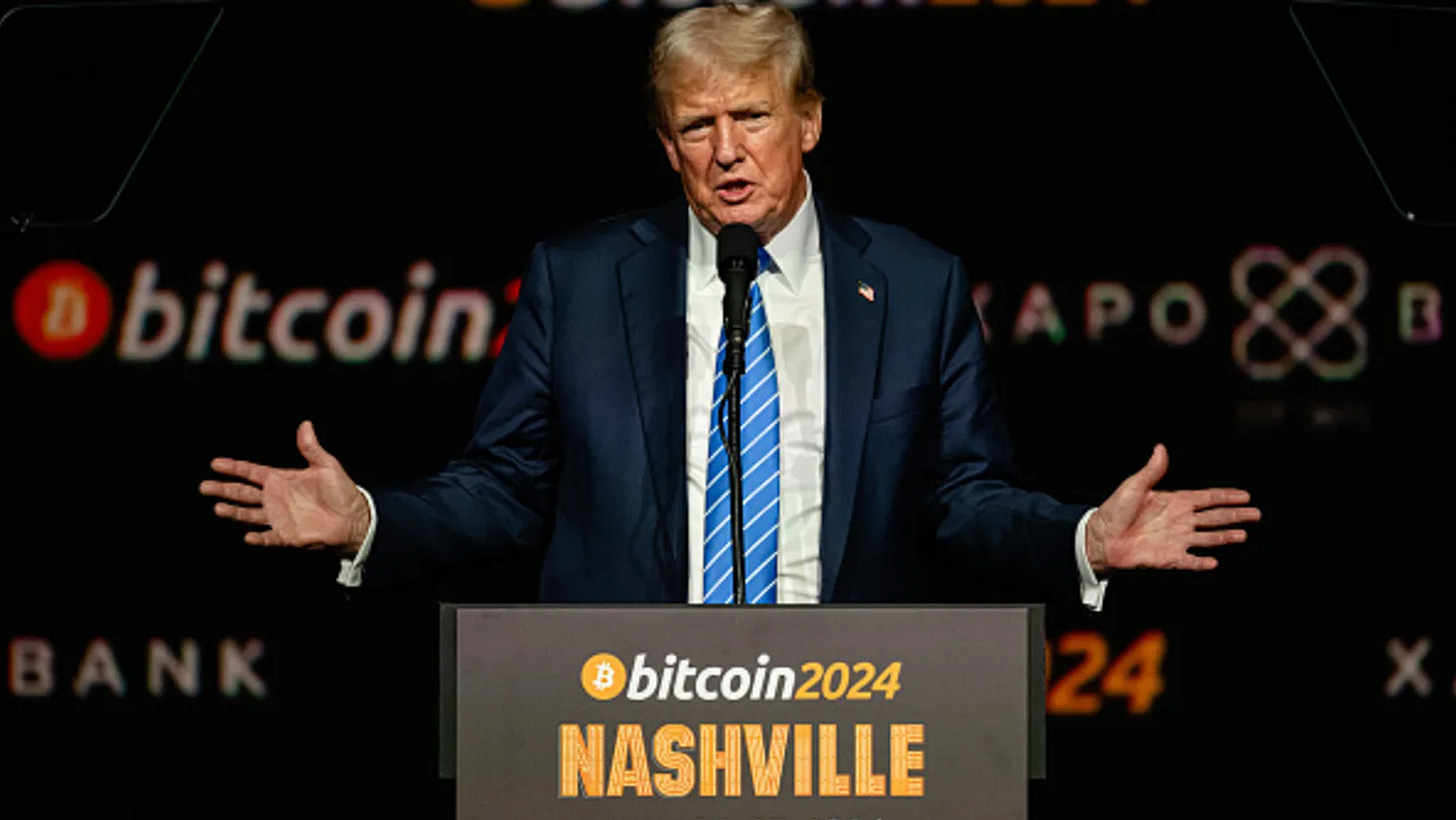After uploading my four latest pieces on the narcissism of the technological revolution we are living through into Google NotebookLM, I asked it to generate a conversation (audio overview), which created two artificial intelligence (AI) chatbots having an impromptu ‘podcast’ discussion about what I've written. Please have a listen to the embedded ‘AI podcast’ above and here and here.
The artificial rendering of a conversation between these two nameless AI interlocutors initially referred to me as “they” based on uploading my first piece on broligarchs (one of Concerning Narcissism’s top six pieces). Then, the AI learned my name after generating a second podcast, embedded above, based on uploading three additional articles. This process of learning my name as the author exemplifies the mechanisms of action behind machine learning through a large language model (LLM), which draws upon vast data stores.
However problematic, these podcasts are unquestioningly an unprecedented and impressive technological feat. Of many problems, the podcast is dumbed down to an impersonal eighth-grade level and overly relies on an American cultural imperative to be hopeful and solutions-oriented.
This sunny imperative pushes my foreboding material into the outer limits of acceptable parsing by, for example, roping in standard tired tropes around the perniciousness of social media, which was scant mentioned in my pieces. Also included were mentions of ‘defund the police,’ ‘diversity and inclusion,’ and ‘move fast and break things,’ which I never covered. Further, the AI podcasters mangled the pronunciation of MAGA as MAN-Gia.
The AI could have corralled the conversation to the parameters and scope of my material without reaching for and pandering to these tangential popular conceits (‘defund the police,’ ‘diversity and inclusion,’ and ‘move fast and break things’) as though driving towards search engine optimization (SEO) based on search-word tags is all that matters, gussied up for “relatability,” all the while doubling down on network silos and echo chambers.
The quality of the conversation, bordering on hallucinating, stalls out and renders itself janky when it circles back to previously touched-on material with a breathless promise of going deeper than never materializes. Attempts to fill in the gaps of what is implied quickly miss the mark.
All this being said, it’s entertaining to see what AI groks. And to think that this podcast presentation is just the beginning of what we can expect going forward is fascinating. As it is, these podcasts can pass for real conversations between humans. At worst, these podcasts are an audio equivalent of a deepfake and, at best, a happy-go-lucky, basic 13-year-old who gets his facts and figures confused.
-GC
First published in Brussels Morning Newspaper.
Brussels Morning is a daily online newspaper based in Belgium. BM publishes unique and independent coverage on international and European affairs. With a Europe-wide perspective, BM covers policies and politics of the EU, significant Member State developments, and looks at the international agenda with a European perspective.
There’s only one way to make money in cryptocurrencies: convince people to pay real money in exchange for fake money.
Fiat currency, such as the dollar, is hypocritically derided in crypto spaces, with the charge that it’s fake because it’s not backed by gold (the gold standard), but neither is crypto. Stablecoins, like those produced by the company Tether, claim to back cryptocurrency 1-to-1 with the US dollar (USD), though the veracity of this contention is dubious. The company refuses to allow an independent audit to verify its claims of full backing.
The USD is still the world’s reserve currency and is prioritized in many countries over their own domestic currency, as the dollar has been historically stable and resistant to hyperinflation.
The last few years have been volatile for the cryptocurrency industry from its zenith in 2021. The launch of cryptocurrency as El Salvador’s legal tender in 2021 suffered a poor rollout and lack of enthusiastic adoption by the country’s citizens due to its monetary instability. Additionally, overhyped NFTs enjoyed a meteoric rise only to suffer a calamitous free fall in value.

And to put a finer point on crypto’s rocky recent years as an ostensible Ponzi scheme was the outsized downfall of crypto-bro Sam Bankman-Fried of the crypto exchange, FTX, at its peak with a market cap of $32 billion to Bernie Madoff’s $65-68 billion. In the end, FTX lost $8 billion in its customer’s money, whereas Madoff lost $18 billion of his customers’ money.
With all the crypto industry’s bluster about the blockchain being a quasi-transparent, pseudonymous ledger decoupled from “oppressive elitist” banking institutions and their government-backed instruments, FTX still managed to evaporate its customers’ funds into thin air, never to be accounted for, and most likely stolen.
James Bromley, a partner at Sullivan and Cromwell, the firm hired to help manage the FTX’s bankruptcy, called it “one of the most abrupt and difficult company collapses in the history of corporate America,” citing the “colossal ineptitude of the managing staff of the company, comprising of Bankman-Fried and his young, inexperienced roommates living together in a penthouse in the Bahamas.”
Bankman-Fried took pains to paint Alameda Research—the trading firm he founded before FTX and owned 90 percent of—as being entirely separate from the exchange, FTX. For Bankman-Fried to have owned both the trading firm and the exchange while contending that they are wholly independent of one another is sketchy and tantamount to a conflict of interest. Lawsuits filed in 2022 contested the two entity’s independence. Further, his “disgraced exchange collapsed in November 2022 after Bankman-Fried swiped user funds to plug an $8 billion debt at its sister company Alameda Research.”
The New York Post published on Nov. 2, 2023, that “The tech mogul was found guilty on all seven fraud and conspiracy charges for his scheme to swipe money from users of his FTX exchange to pay off debts at his failing hedge fund Alameda Research and purchase lavish real estate, leading to FTX’s implosion,” when customers were unable to withdraw their funds.
“Bankman-Fried chalked up the collapse to “oversights” in “risk management” and testified that he wasn’t aware that his hedge fund had “borrowed” billions from his exchange until days before the implosion.”
Bankman-Fried, a fallen giant in the field, represents the poster child for crypto’s financial malfeasance. On March 28th of this year, having shown little to no emotion during his trial, Bankman-Fried, 32, was sentenced to 25 years in prison.

Adding insult to injury, Bankman-Fried maintained that he was an “effective altruist,” driven to harness his MIT mathematics bona fides to acquire vast wealth to be distributed philanthropically. Though he did donate substantially to the Democratic party, he has sociopathically since admitted that his philanthropic “effective altruism” schtick was only for PR purposes.
A number of high-profile celebrities and athletes (Tom Brady, Gisele Bundchen, Stephen Curry, the Golden State Warriors, Shaquille O’Neal, Udonis Haslem, David Ortiz, William Trevor Lawrence, Shohei Ohtani, Naomi Osaka, Larry David, and Kevin O’Leary) who advertised on behalf of FTX are now taking a bath with an angry mob of 1 million customers in a class action lawsuit who want their money back.
In a substantial blow to the crypto industry’s reputation, on August 8th, 2024, A U.S. judge ordered FTX and Alameda Research to pay a whopping $12.7 billion to creditors.
Despite crypto’s checkered reputation, America’s politicians, Republicans and Democrats alike are all in if there is a financial and political upside to be realized.
As of this writing, according to the website Follow the Crypto, some $174 million has influenced US elections in this watershed crypto-backed political calendar year, a radical scaling up from some approximately $10M from crypto super PACs for the prior election cycle just four years ago.
Approximately half of all corporate donations for the US 2024 presidential election have come from the cryptocurrency industry, outspent only by the fossil fuel industry.
Long a bastion of the libertarian right, crypto is now strong-arming Democratic candidates to overnight sing crypto’s praises if their candidacy is to have any viability. By refusing to endorse crypto, Katie Porter lost her re-election bid for Senate in California. ~$10M of cryptocurrency-focused PACs defeated Porter.
Crypto, a brainchild of California, has more political donations in play than any other state, hardly surprising considering California is the birthplace and leading progenitor of narcissism through its conduits of Hollywood and Silicon Valley to furnish the world with fantastical thinking.
Of (tech bro) fantasies, Prof. Sam Vaknin, a foremost expert on narcissism, departs from traditional psychoanalysis by postulating that fantasies are reactive defenses against trauma, pain, hurt, abuse, and egregious protracted breach of boundaries. They also defend against an intolerable, burdensome, and unbearable reality:
The first role of the fantasy is a vehicle to revisit areas and realms in the narcissist’s history and existence that otherwise are inaccessible.
Number two, the fantasy provides a secure base. When the narcissist is immersed in the fantasy, when he is in the throes of the fantasy, he is oblivious to reality. He’s not aware of his surroundings, environment, other people, expectations, behaviors, wishes, and demands; he’s totally not there. He’s no longer with us when he’s in the fantasy. At that point, he feels very safe. He feels secure, and the world appears to be stable, predictable, and determinate. Fantasy, therefore, is a maternal substitute. The fantasy is the womb. When the narcissist enters the fantasy, he goes back to the womb. He reverts to the period of gestation before he was born, and in that womb, in that maternal reification, the narcissist feels utterly secure, safe — no danger, no risk, no predicament, no menace, no threats — a secure base, a maternal figure in a way.
Number three, the fantasy provides the narcissist with compensatory traits. Remember that pathological narcissism is a compensation for some deficiency. The narcissist internally has a bad object, a coalition of voices and introjects that inform the narcissist that he is inadequate, unworthy, a loser, stupid, ugly, good for nothing, and so on and so forth.
Narcissists are addicted to fantasy — incapable of relating to other people, to the world at large, and, even more importantly, to themselves. The narcissist is a slave to fantasy.
Why Narcissists Fantasize (How Trauma Shapes Fantasy) by Prof. Sam Vaknin
Fantasist former president Donald Trump once criticized Bitcoin as “not money” and “highly volatile and based on thin air.” He also cautioned that crypto assets helped facilitate illegal underground markets.
“We have only one real currency in the USA, and it is stronger than ever,” Trump wrote on Twitter in 2019. “It is called the United States Dollar!”
He has since changed his tune, raking in $25 million since May in crypto donations.
What a difference a few years makes — after cratering in 2022 in the aftermath of FTX’s implosion, the price of Bitcoin has recovered and reached an all-time high in June.
Now, all three of Trump’s sons, Don Jr., Eric, and Barron, are in on the action, having launched their own World Liberty Financial coin (WLFI) in September. WLFI will be available for trading to the public on October 15th.
Trump’s 18-year-old son Barron, a first-year student at New York University, is identified as the coin’s “DeFi visionary,” according to a white paper on the project obtained by cryptocurrency news site CoinDesk. “DeFi,” short for decentralized finance, as opposed to “TradFi” or traditional finance, is a term that refers to financial services offered through public blockchains.
World Liberty Financial’s website has a splash page entreating prospective customers that you, too, can be “cool” and “DeFiant,” a play on the DeFi vision, which happens to conjure up a characteristic of psychopathy — defiance.
Psychopathic fraudster Martin Shkreli, known as “Pharma Bro,” credits himself that he helped Barron Trump create the previously issued in June DJT token. Shkreli infamously jacked up the price of an antiparasitic drug, Daraprim, by >4000% overnight from $17.50 to $750 a pill. Shkreli was convicted of securities fraud and sentenced to seven years in prison and up to $7.4 million in fines. Shkreli is permanently banned from serving as an officer of any publicly traded company and from working in the pharmaceutical industry.
On August 6th, the DJT token plummeted 90% after a single wallet sold $2 million worth in one transaction, reducing its market cap to $3 million from $55 million. Shkreli denies that he’s behind the precipitous tanking.
Cryptocurrencies reify Cluster B personality disorders (antisocial, borderline, histrionic, narcissistic) and Cluster A personality disorders (paranoid, schizoid, schizotypal) in a compensatory craving for power and control through a parallel monetary system.
Cryptocurrency as a freedom-chasing schema purports to obviate TradFi, while, in reality, duplicates many of the same power structures, especially as it colludes with establishment politics. It just so happens that these new power structures benefit the tech titans at the top of the food chain. For example, one study found that 0.01% of the richest Bitcoin accounts hold about 58% of all Bitcoins. Additionally, less than 100 participants control over 51% of the wealth in the ecosystem, potentially indicating a security threat.
The crypto industry regularly bankrolls super PACs that have overwhelmingly supported Republicans over Democrats. As noted, the Trump campaign has raised $25 million from the crypto industry since it began accepting cryptocurrency donations in May. “MAGA supporters, now with a new cryptocurrency option, will build a crypto army, moving the campaign to victory on November 5th!” the campaign has said.
In his prescient 2016 book warning about crypto’s plot to overturn America, The Politics of Bitcoin: Software as Right-Wing Extremism, the late David Golumbia (1963-1923) exposes the synergies between cyber-libertarianism and conservative ideology.
Golumbia wrote, “The whole point of the [crypto] enterprise, as with most of the efforts promoted by libertarians and anarcho-capitalists, is to enable a wide range of extractive and exploitative business practices, and thus to increase the power of corporations and capital outside the scope of any attempts by democratic polities to constrain them.”
Golumbia underscored the point by stating that even anti-government thinker Noam Chomsky “declared that libertarian theories, despite surface appearances, promote ‘corporate tyranny, meaning tyranny by unaccountable private concentrations of power, the worst kind of tyranny you can imagine,’”— ironic projection for an authoritarian movement that is obsessed with overcoming “tyranny” and “freedom” from central banks, namely the US Federal Reserve.
The idea that cryptocurrencies could usurp and overtake the USD is a practical non-starter in that the computational power required, both in speed and energy, is not unlike attempting to wholesale replace fossil fuels with solar and wind energy — both scenarios, equally out of reality.
Both crypto and AI are energy hogs with no easy energy solution in sight while the stakes of climate change continue to ascend at an alarming clip. Reinvigorating nuclear energy appears to be the only viable option for Big Tech’s energy demands. After a radioactive meltdown shuttered it in 1979, Three Mile Island, the nuclear power plant near Middletown, Pennsylvania, will be reopening to power Microsoft’s AI.
Relying on the fantastical ideology of AI and crypto with a dreamer’s mindset is not sufficient in the face of the time crunch and pressure cooker that is climate change. The lacuna between the dreamscape and reality reveals the impassable gulf between fantasy and reality with potentially deadly consequences. We could all fall into this fantastical ditch.
Crypto proselytizers push counterfactual notions of freedom — a claim that’s rich, emanating from a culture with authoritarian right-leaning roots in anti-government, crypto-anarchistic cypherpunks who create thin arguments about banking the unbanked around the globe as a value proposition, no matter crypto’s volatility and penchant for the facilitation of criminality.
Meanwhile, millions of customers have been routinely scammed and defrauded —sometimes robbed of their life savings. Long a hotbed for criminal activity, crypto cost Americans $5.6 billion last year alone in scams, up 45% from the year prior. Scams come with the territory, so the blasé crypto thinking goes; the crypto cult mindset considers being scammed a rite of passage to create thicker skin, though it doesn’t always work out that way. This fantasy-based macho culture is straight-up dangerous.
One crypto addict-gambler, Hal Henson, in his sixties, featured in Ben McKenzie and Jacob Silverman’s book Easy Money: Cryptocurrency, Casino Capitalism, and the Golden Age of Fraud bet the farm on crypto. Broke and having exhausted his other financial lifelines — friends and family — he reached out to the crypto “community” for emotional support, and the last word of so-called solace they offered him before he committed suicide was a one-word mandate: “Buy!”
The promise of societal control that jackbooted fascism offers and that America faces if and when Trump returns to the White House may be an emotional knee-jerk reaction to the onslaught of technological changes at hand, including AI, network states, and techno-feudalism.
The fascistic social imperative to clamp down when elements of civilization are spiraling suggests a rigidity that is a hallmark of mental illness; it’s possible to overdo social control such that control fails to mitigate the spiraling but instead encourages more social conflict and dysfunction, if not chaos. Fascism leads to war.
In his book The Network State, centi-millionaire polymath Balaji Srinivasan writes that he believes another American civil war will result from a cascade of American anarchy, Chinese control, and an international intermediate. He predicts a civil war would catalyze from America’s being broke and attempting Bitcoin seizures — a situation he calls “American Anarchy.”
It’s a dangerous game to have America’s two major political parties, Republicans and Democrats alike, cozy up to crypto’s deep pockets when it is the crypto industry that seeks to undermine the USD and the concept of America as a nation-state in favor of tech-driven network states. “Democracy” has increasingly revealed itself to be a plutocracy, eating out of the hand that feeds it.
As it is, America is no longer a Democratic Republic, according to Barbara F. Walter’s book, How Civil Wars Start: and How to Stop Them. It’s been downgraded to an anocracy, a combination of democracy and dictatorship. It’s difficult, if not impossible, to maintain a society “of the people, by the people, for the people” in the face of billionaire headwinds. What we are left with (on a good day) is the verisimilitude, the appearance of being true or real, of democracy.
Trump’s VP pick JD Vance is in the back pocket of crypto and justifies his allegiance in order to tear down Big Tech’s fidelity to diversity, equity and inclusion (DEI) and — while he’s at it, covertly America as a nation-state. JD Vance also complains that attempts to regulate cryptocurrency would entertain a surveillance state and a backdoor ban on Bitcoin and other popular cryptocurrencies.
Forty-three percent of American men ages 18 to 20 say they have invested in, traded, or used cryptocurrency, compared to 16% of the general population. While crypto bro’s fantasize that they can re-engineer their abusive childhoods out from under the thumb of Big Government who stands in for mommy issues, it is society at large who suffers as the newly abused.
Bonus content:
Shared Fantasy, Dual Mothership, Snapshotting YouTube playlist by Prof. Sam Vaknin
Venture Capital Extremism
Silicon Valley, the New Lobbying Monster: From crypto to A.I., the tech sector is pouring millions into super PACS that intimidate politicians into supporting its agenda. by Charles Duhigg for The New Yorker
HBO’s Money Electric: The Bitcoin Mystery
Megalopolis (2024) Official Trailer - Adam Driver, Giancarlo Esposito, Nathalie Emmanuel
Megalopolis is a 2024 American epic science fiction drama film written, directed, and produced by Francis Ford Coppola. Megalopolis explores the tension between fantasy and reality. It offers a more positive vision of the future but absurdist and the height of spectacle and debauchery.
MEGALOPOLIS is a Roman Epic set in an imagined Modern America. The City of New Rome must change, causing conflict between Cesar Catilina (Adam Driver), a genius artist who seeks to leap into a utopian, idealistic future, and his opposition, Mayor Franklyn Cicero (Giancarlo Esposito), who remains committed to a regressive status quo, perpetuating greed, special interests, and partisan warfare. Torn between them is socialite Julia Cicero (Nathalie Emmanuel), the mayor's daughter, whose love for Cesar has divided her loyalties, forcing her to discover what she truly believes humanity deserves.













Share this post